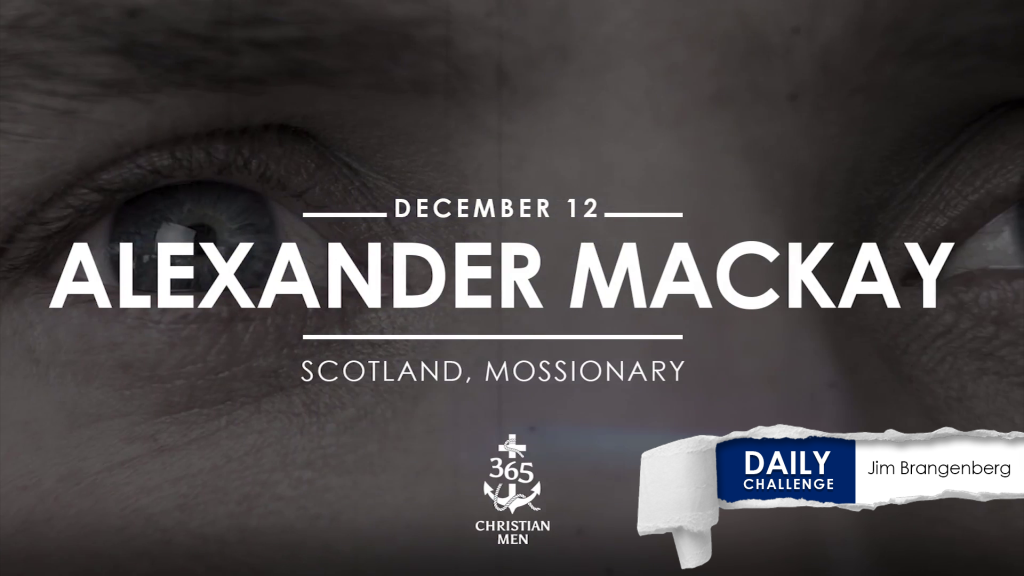December 12. Alexander Mackay. When Mackay was three, he read the New Testament, and at seven, he read Decline and Fall of the Roman Empire. His father taught him geography, astronomy, and geometry. From eleven on, Mackay got interested in engines, blacksmithing, and the trades, and then mathematics, photography, and even shipbuilding. But when he was sixteen, and his mother died, he threw himself into the Scriptures—and the direction of his life was set.
When famous African explorer Henry Stanley challenged any brave Christian willing to spread the faith and work hard—to come to Uganda, Mackay was all in. He would go to Africa as an engineer-missionary. He would tell King Mutesa about King Jesus.
Mackay hacked a road 230 miles through a jungle so dense “a cat could scarcely creep along.” He traveled—land and river—for 700 miles, navigated a battered boat over Lake Victoria (an inland sea as big as Ireland), all the while driven by his fierce love for God and a bold determination. He created an alphabet for the local unwritten language and taught boys to read the Lord’s Prayer. Mackay translated Matthew’s Gospel into Luganda. But he didn’t see the success he hoped for.
However, within 6 years of Mackay’s death, 100,000 people had been brought into close contact with the Gospel, and half of them could read it for themselves. Native Christians had built 200 buildings where they worshipped God, and they supported 200 native evangelists and teachers. There were 10,000 copies of the New Testament circulating—“and all this in the center of the thickest spiritual darkness in the world.” Here’s his story.
Driven by a fierce love for God, a man is unstoppable.
Alexander Mackay stood before one of the most powerful men in the African interior—King Mutesa, who ruled with ruthless authority. The king even called for human sacrifices to appease the imaginary gods. Would the king believe what Mackay had to say?
Although the king’s dark eyes invoked a kind of primal dread, Mackay wasn’t afraid. He stared right back at the king—eyeball-to-eyeball and thrilled to share the message of hope in Jesus.
“I am here, O King, to prepare a way for the coming of God’s Son, and I want you to join me in pointing the people of this land to the Lamb of God, who alone can take away the sin of the world,” Mackay announced.
Mutesa listened with interest, but he wasn’t convinced enough to submit to Mackay’s message. The king did allow Mackay to hold Sunday services so he could hear more of what God’s Word had to say.
In the beginning, Mackay had a remarkable way of influencing Mutesa for good. But one day, Arab traders appeared at court and gave Mutesa guns, ammunition, and yards of red cloth—in exchange for male and female slaves.
Mackay stepped in and objected. He asked Mutesa if he was willing to sell his own people to be chained, beaten, whipped, and taken to other lands. Was he willing that others should laugh about him and say, “That is how King Mutesa lets strangers treat his children!” With this, and other challenging words Mackay appealed to the king’s manhood.
Mutesa talked it over with his chiefs and decided his people would not be slaves—but all the same, Mutesa remained a slave to sin. He continued raiding other tribes and offering gruesome human sacrifices to appease false gods. In fact, sin seemed to increase more and more.
Mackay wrote in his diary, “… Every crime and form of uncleanness is rampant in the country. Each day reveals fresh tales of iniquity, cruelty, and oppression.”
When Mutesa died, his son M’wanga took over, and things went from bad to so-much-worse.
Mackay didn’t give up. Until the day he died, he served Christ faithfully in Africa.
“All these people were still living by faith when they died. They did not receive the things promised; they only saw them and welcomed them from a distance, admitting that they were foreigners and strangers on earth. … And what more shall I say? I do not have time to tell about Gideon, Barak, Samson, and Jephthah, about David and Samuel and the prophets, who through faith conquered kingdoms, administered justice, and gained what was promised; who shut the mouths of lions, … These were all commended for their faith, yet none of them received what had been promised, since God had planned something better for us so that only together with us would they be made perfect” (Hebrews 11: 13, 32, 33, 39, 40 NIV).
Do you believe the victory belongs to God? Are you willing to commit the hard times to God and not give up? Driven by a fierce love for God, a man is unstoppable.
Note: Mutesa is also sometimes spelled Mtesa.
Boone, Ilsley. The Conquering Christ. Boston: Bible Study Publishing Company, 1910.
Harrison, Eugene Meyers. “Alexander Mackay: Road-Maker for Christ in Uganda.” Missionary Biographies. Date Accessed: August 14, 2020. https://www.wholesomewords.org/missions/biomackay.html.
Lambert, John C. “Alexander Mackay, The Hero of Uganda.” Missionary Biographies. Date Accessed: August 14, 2020. https://www.wholesomewords.org/missions/biomackay7.html.
Mathews, Basil. “Alexander Mackay: Fighting the Slave Trade (1878).” Missionary Biographies. Date Accessed: August 14, 2020. https://www.wholesomewords.org/missions/biomackay13.html.
Story read by Chuck Stecker
Story written by Toni M Babcock, https://www.facebook.com/toni.babcock.1





